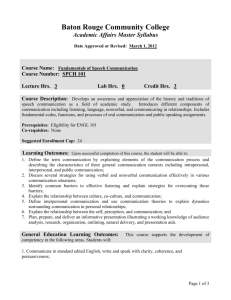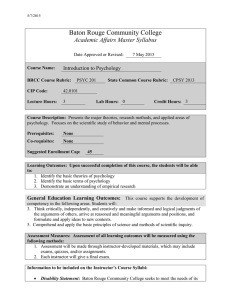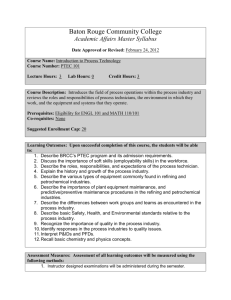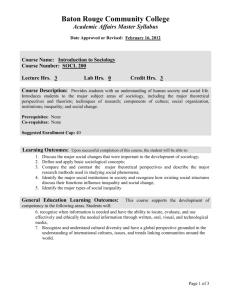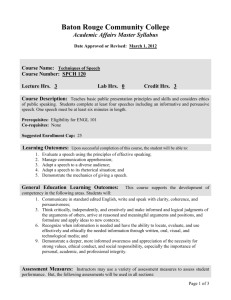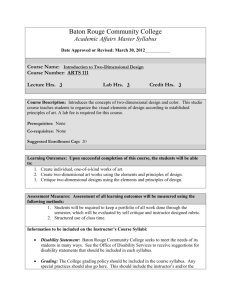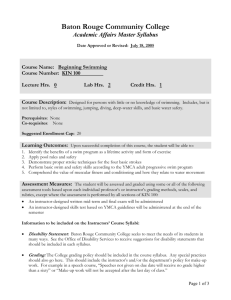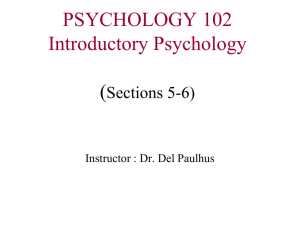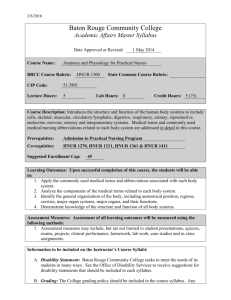PSYC 200 - Baton Rouge Community College
advertisement
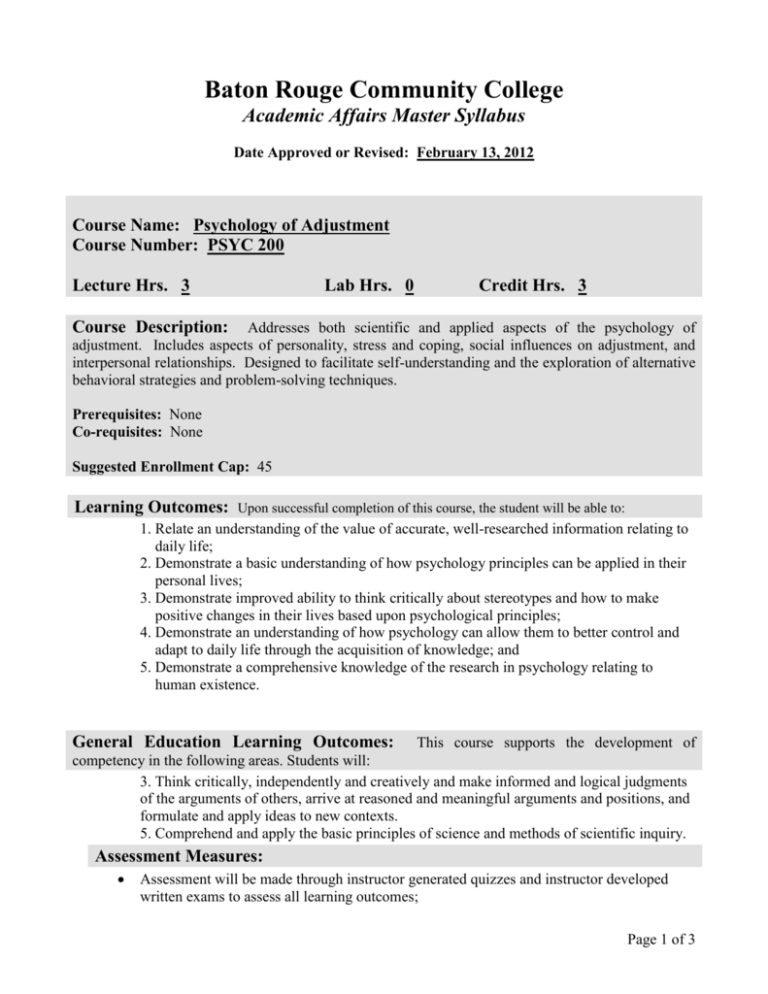
Baton Rouge Community College Academic Affairs Master Syllabus Date Approved or Revised: February 13, 2012 Course Name: Psychology of Adjustment Course Number: PSYC 200 Lecture Hrs. 3 Lab Hrs. 0 Credit Hrs. 3 Course Description: Addresses both scientific and applied aspects of the psychology of adjustment. Includes aspects of personality, stress and coping, social influences on adjustment, and interpersonal relationships. Designed to facilitate self-understanding and the exploration of alternative behavioral strategies and problem-solving techniques. Prerequisites: None Co-requisites: None Suggested Enrollment Cap: 45 Learning Outcomes: Upon successful completion of this course, the student will be able to: 1. Relate an understanding of the value of accurate, well-researched information relating to daily life; 2. Demonstrate a basic understanding of how psychology principles can be applied in their personal lives; 3. Demonstrate improved ability to think critically about stereotypes and how to make positive changes in their lives based upon psychological principles; 4. Demonstrate an understanding of how psychology can allow them to better control and adapt to daily life through the acquisition of knowledge; and 5. Demonstrate a comprehensive knowledge of the research in psychology relating to human existence. General Education Learning Outcomes: This course supports the development of competency in the following areas. Students will: 3. Think critically, independently and creatively and make informed and logical judgments of the arguments of others, arrive at reasoned and meaningful arguments and positions, and formulate and apply ideas to new contexts. 5. Comprehend and apply the basic principles of science and methods of scientific inquiry. Assessment Measures: Assessment will be made through instructor generated quizzes and instructor developed written exams to assess all learning outcomes; Page 1 of 3 Text publisher test bank questions will be used for chapter, unit, and final exams to assess all learning outcomes; Each instructor will give a final exam; and A paper will be written by the student to demonstrate effects of psychology in their life. Information to be included on the Instructors’ Course Syllabi: Disability Statement: Baton Rouge Community College seeks to meet the needs of its students in many ways. See the Office of Disability Services to receive suggestions for disability statements that should be included in each syllabus. Grading: The College grading policy should be included in the course syllabus. Any special practices should also go here. This should include the instructor’s and/or the department’s policy for make-up work. For example in a speech course, “Speeches not given on due date will receive no grade higher than a sixty” or “Make-up work will not be accepted after the last day of class.” Attendance Policy: Include the overall attendance policy of the college. Instructors may want to add additional information in individual syllabi to meet the needs of their courses. General Policies: Instructors’ policy on the use of things such as beepers and cell phones and/or hand held programmable calculators should be covered in this section. Cheating and Plagiarism: This must be included in all syllabi and should include the penalties for incidents in a given class. Students should have a clear idea of what constitutes cheating in a given course. Safety Concerns: In some programs this may be a major issue. For example, “No student will be allowed in the safety lab without safety glasses.” General statements such as, “Items that may be harmful to one’s self or others should not be brought to class.” Library/ Learning Resources: Since the development of the total person is part of our mission, assignments in the library and/or the Learning Resources Center should be included to assist students in enhancing skills and in using resources. Students should be encouraged to use the library for reading enjoyment as part of lifelong learning. Expanded Course Outline: I. Adjusting to Modern Life II. Stress and Coping III. Social thinking and Social Influence IV. Interpersonal Communication Page 2 of 3 V. .Interpersonal Communication VI. Friendship and Love VII. Marriage and Intimate Relationships VIII. Careers and Work IX. Development and Expression of Sexuality Page 3 of 3


